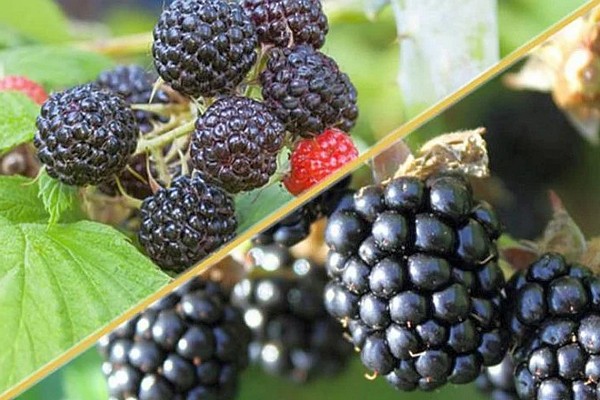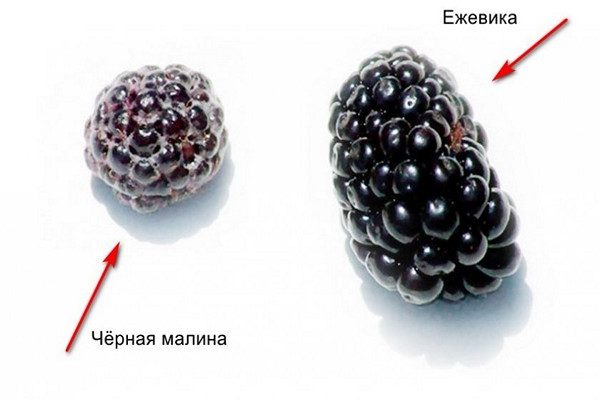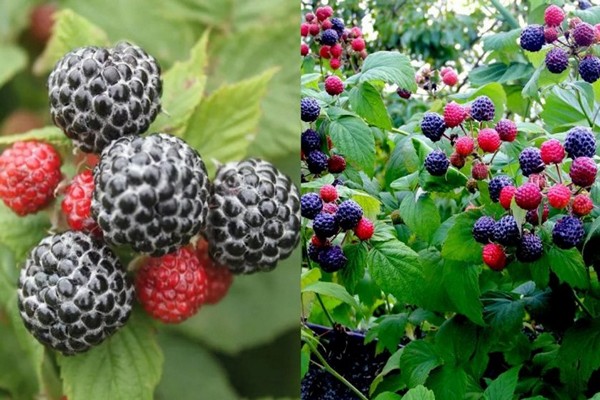Black raspberry and blackberry differences
Content:
Quite often, due to the external similarity, and not knowing about the biological characteristics of these plants, amateur gardeners confuse blackberries and black raspberries. But this is far from the same thing. Black raspberries and blackberries are fundamentally different. In this article, we will consider the main features of these two cultures, and we will never confuse them later.
Raspberries and blackberries: external similarities and differences

photo: raspberry and blackberry differences
First of all, we note the main similarity between the two crops - the color of the berries. Both plants have red berries that turn black as they ripen.
Bush and leaf shape also have great similarities. Both black raspberries and blackberries look like a bush with thorny shoots. However, the stems of black raspberries are shorter than blackberries and are light in color with a slightly lilac bloom that wears off if the stem is rubbed. Blackberry shoots are much more powerful, grow up to 3m in length, green in color. They form a dense, dense bush, whereas the black raspberry bush is sparse, the stems grow without constraint.
Concerning thorns, then there are differences here too. Black raspberry thorns are similar to red thorns, but more frequent and outwardly as if pubescent. Blackberry thorns are large and rare, similar to rose thorns.
Berry shape is also a very misleading sign. Here everything seems to be the other way around, blackberries are very similar in appearance to red raspberries. They have a slightly elongated shape, and based on the specific characteristics of a particular variety, they can be either shiny or with a slight whitish bloom. Blackberries store well and can be successfully transported as they are denser than raspberries.
Black raspberries are characterized by rounder berries, hollow inside, with a light bloom and small villi on the surface. They are also dense and retain their marketable appearance for a long time.
But not only the shape is different, but also the structure of the berry itself. Despite the fact that from a biological point of view, the fruit of black raspberries and blackberries consists of single-seeded drupes connected by small villi, there are a number of differences.
Blackberries form drupes around the base, which is white, that is, the berries are not empty inside. When detached from the stem, they come off together with the receptacle where they were attached to the shoot.
Raspberry berries, as we mentioned just above, are hollow inside and when removed from the bush, they easily come off the receptacle.
Raspberries and blackberries: differences in agrotechnical characteristics

black raspberries and blackberries: the difference
Before starting a conversation about the difference in agrotechnical methods for caring for both plants, it is worth dwelling on two more biological features of black raspberries and blackberries - this is the flowering period and the ripening time of berries.
Both plants belong to plants with late flowering period, which is a kind of natural protective factor against damage from recurrent frost. However, black raspberries begin to bloom a little earlier than blackberries, in the first decade of June, and blackberries in the second.
Different and harvest period... You can start trying black raspberries in July (at the beginning or in the middle, it all depends on the variety and weather conditions), but blackberries will arrive in time by August.
Among other things, it should be noted that black raspberry is a remontant culture and the berries ripen on it together, and blackberries are capable of producing crops before the onset of the first autumn frosts. In general, the level of yield obtained from one blackberry bush is noticeably higher than that of black raspberries.For comparison, based on the characteristics of a particular variety, up to 20 kg of berries can be harvested from one blackberry plant, and no more than 4 from one raspberry bush.
Now let's talk about the requirements of plants for soil composition, weather conditions and care features.
Both crops do not tolerate stagnant moisture in the soil, they need a well-drained, moderately fertilized site.
Best soil composition for the growth of blackberry-loam with a neutral or slightly acidic reaction (in no case a limestone soil), with a sufficient content of trace elements such as iron and magnesium. With a lack of these elements, plants become weak and subject to various diseases such as chlorosis.
When planting a blackberry on the site, choose a well-lit place for it, this berry does not like shade at all.
To cultivate black raspberries, you need a well-fertilized, loamy and sandy loam soil. Good yields demonstrate black raspberryplanted in black soil, or forest soil.
Concerning illumination, then a small shadow is fine for black raspberries.
The lack of moisture in the soil is not critical for either blackberries or black raspberries; they tolerate dry weather quite firmly. However, blackberries are a little tougher in this sense. True, to obtain stable yields, both plants need moderate watering during the formation of the berries.
And here resistance to low temperatures blackberries are much lower than black raspberries. With the onset of cold weather (especially in the absence of snow cover), the blackberry will need shelter so that the roots and shoots do not freeze. Already at an air temperature below -15 ° C, the blackberry bush can die, while the raspberry will withstand a drop to -25 ° C. But still, if you grow black raspberries in areas where air temperatures in winter fall below these values, it will not be superfluous to cover raspberries.
Outcome

In conclusion, it should also be noted that since the plants we are considering are close relatives, it is better to plant them at a certain distance from one another (they also should not be predecessors for each other) in order to avoid the spread of various kinds of diseases to which both plants are susceptible. So, for example, various fungal infections, or verticillary wilting can be in the ground for a long time and instantly affect young seedlings.
You should also not plant blackberries and black raspberries in the neighborhood with representatives of the nightshade family: eggplants, tomatoes, potatoes.
After reading this article, you will most likely never confuse these plants with each other, but for sure you want to have both plants on your site. After all, both black raspberries and blackberries, each in their own way, are good and tasty, and deserve to stay in your garden for a long time.

